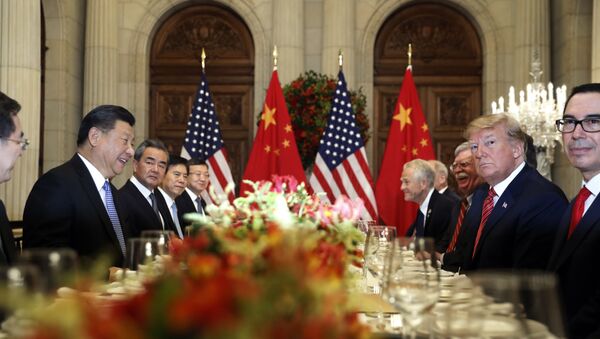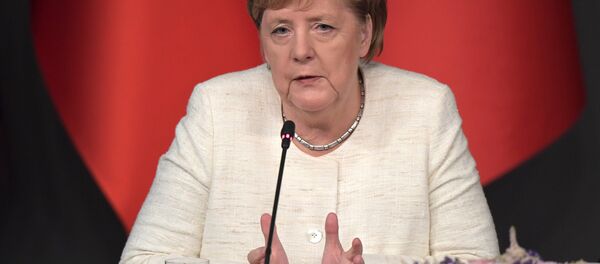Fears that the network of agreements limiting the proliferation of nuclear arms and other weapons could be in jeopardy have grown since Washington and Moscow announced their withdrawal from the Intermediate-Range Nuclear Forces (INF) Treaty.
Merkel's call to launch a fresh push for disarmament and to include the rising military power of China met with a brisk rebuff from a top Beijing official — and was simply ignored by senior US and Russian figures.
READ MORE: Trump, Xi Likely to Meet in Late March at Mar-a-Lago Amid US-China Trade Talks
Radio Sputnik has discussed Angela Merkel's speech with Wang Yiwei, a professor specializing in international relations at the Beijing-based Renmin University of China.
Sputnik: What is your take on the current status of US-China relations, have they improved in recent months? Or is this still a frozen conflict?
Wang Yiwei: Well, China-US relations are about ideology; they are about different development models. The US claims that China is not a market economy, [that] we have really strong state enterprises, due to AI, the digital economy, like Huawei in 5G. So that's what the Americans consider. The Chinese challenges are not just quantity, but quality; it is structural and above. So they force the European alliance to not to use Huawei because [it will be] difficult in the future for the US to spy on their allies, to keep their system. So I think that [this] confrontation is just the beginning, but with the trade war, maybe we can have success at the end of this month and make a deal, but the structural confrontation, I think, is just beginning.
Wang Yiwei: Well, because now President Trump cannot represent the US anymore. After the midterm elections, the Democrats control the House of Representatives. In this regard, I think China [is] really concerned about who represents the US, who can make a deal with China.
Sputnik: How significant was Angela Merkel's speech at the Munich Conference for defining relations between the United States and Europe? What effect could this have on China? Do you think it is going to be more beneficial?
Wang Yiwei: Well, the European side, particularly the German side, is really complaining and concerned about the US unilateral trade war against German automobile factories and also on Iran on the nuclear issue. Then the thing about their future, it definitely should be in their own hands. So they have the SPV, they have [to have] their own SWIFT system to bypass the US alliance or the dollar hegemonic system.
READ MORE: Critics Decry Chinese Social Credit System, Ignore US Credit Score Scheme
I think that is a very good direction. China and the European Union [have] always supported the multipolar world and multilateralism. We all felt the threat from Donald Trump's "America First" and unilateralism; I think Russia, as well. I think we should work together to make the Iranian nuclear deal a multilateral system to keep the post-World War II system based on the United Nations.
Sputnik: What role is China prepared to play in world affairs as the US finds itself more and more isolated? Do you think there is a possibility [China] might be interested in taking the lead on the international arena, or is it mostly concerned about the well-being of its citizens?
So we need more markets outside of China; we need a more stable and peaceful environment in the world. So China is more and more involved in international peacekeeping and in negotiations. I think that is not just in Chinese national interests, but [in] other human beings' interests as well. President Xi Jinping put forward the Belt and Road Initiative (BRI) and a community for a shared future for mankind.
Sputnik: About 14 months ago, Xi Jinping addressed the State of Union address in China to say that he was very, very hopeful that the Chinese economy would become the number one global economy within a 20-year timeline. Do you think that this is still on track for achieving the number one global economic status for China, or has this affected that particular projection?
Wang Yiwei: Well, we say we have a greater regeneration of the Chinese nation. I think [in terms of] per capita GDP, China is still ranking around number 70, so we still have a huge potential for growth. The Chinese GDP is only 70 percent of the US; our per capita GDP [is] only 1/7 of the United States. So according to the Chinese government's goals to improve Chinese livelihood, I think the Chinese GDP will pass the United States sooner or later. That is very natural. I think the United States should understand this.
The views and opinions expressed by the speaker do not necessarily reflect those of Sputnik.





